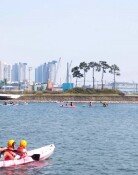[Opinion] Congestion Charges on Dept. Stores
[Opinion] Congestion Charges on Dept. Stores
Posted May. 16, 2008 06:44,
On weekends and holidays and during sale periods, streets surrounding large department stores in Seoul are packed with cars, literally unfolding a scene of sea of cars. Long lines of passenger cars, which try to go into parking lots of department stores, occupy two to three lanes of a four-lane road, leaving other cars stuck on the road. Drivers blow horns and yell, and some even utter curses. The situation is particularly worse in areas near Lotte Dept. Store and Shinsegae Dept. Store in Sogong-dong, central Seoul, Lotte World and Lotte Dept. Store in Jamsil-dong, southwestern Seoul, and COEX and Hyundai Dept. Store in Samseong-dong, southern Seoul.
The Seoul Metropolitan Government has taken several steps to resolve the problem. It has designated 69 big buildings as facilities subject to special supervision for reducing traffic congestion, and announced that it would impose a congestion charge of 4,000 won on drivers on roads near 10 such buildings including department stores beginning next March. The city government is set to levy congestion tolls on its citizens if the number of vehicles does not decline over 30 percent even after it implements a campaign to leave ones car at home one day a week on a trial basis later this year. If this congestion fee scheme is found successful, it plans to expand it to all 69 buildings. Seoul City seems to have concluded that it is the only solution to deal with perennial traffic jams in those areas. This scheme has already become a bone of contention on the Internet.
Most of those who are in favor of the plan even call for a more severe penalty, saying, A 4,000 won fine is not effective. At least 10,000 won will make a difference. On the contrary, some criticize the measure, saying that it is no less than an excessive regulation that prioritizes administrative expediency, and that it is kind of dual taxation because there is already a tax against traffic congestion in place. Some worry the scheme will result in encouraging illegal parking on narrow streets behind department stores. Officials of department stores also oppose the plan, pointing out its ineffectiveness, Middle-class customers wont carry heavy bags in their hands for fear of paying 4,000 won. Others say it goes against the new governments effort to boost the economy by invigorating consumption.
The conceived congestion charge is also being criticized as a low-level punishment. It is expected to bring about no practical effect since department stores can get away with the punishment by giving out gift coupons to customers to make up for the fines. It will be better to revive a shuttle bus system that was banned in 2001 due to opposition from traditional open markets and public transportation businesses. In fact, the ban on the shuttle bus operation, which was aimed at helping small merchants and the self-employed, did not produce any tangible results. Rather than levying 4,000 won on drivers, Seoul City would do well to give incentives to citizens who use public transportation.
Editorial Writer Yuk Jeong-soo (sooya@donga.com)







